| |
|

Thursday, June 5 Tifereth Israel's 'Girls Night Out'
 . .

Friday-Saturday, June 6-7 JFS~Judaism on the Wild Side


Sunday, June 8 Temple Solel~Tikkun Leil Shavuot


SUNDAY, JUNE 8 Ohr Shalom Shavuout Service
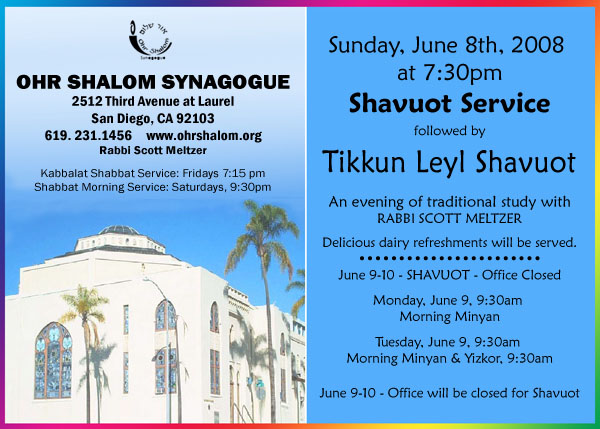



What Obama told AIPAC June 4
Editor's Note: Following is the text of a speech delivered Wednesday by the presumptive Democratic party nominee Barack Obama to the American Israel Public Affairs Committee in Washington, D.C.
By Senator Barack Obama
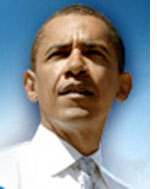 WASHINGTON, D.C.—It’s great to see so many friends from across the country. I want to congratulate Howard Friedman, David Victor and Howard Kohr on a successful conference, and on the completion of a new headquarters just a few blocks away. WASHINGTON, D.C.—It’s great to see so many friends from across the country. I want to congratulate Howard Friedman, David Victor and Howard Kohr on a successful conference, and on the completion of a new headquarters just a few blocks away.
Before I begin, I want to say that I know some provocative emails have been circulating throughout Jewish communities across the country. A few of you may have gotten them. They’re filled with tall tales and dire warnings about a certain candidate for President. And all I want to say is - let me know if you see this guy named Barack Obama, because he sounds pretty frightening.
 But if anyone has been confused by these emails, I want you to know that today I’ll be speaking from my heart, and as a true friend of Israel. And I know that when I visit with AIPAC, I am among friends. Good friends. Friends who share my strong commitment to make sure that the bond between the United States and Israel is unbreakable today, tomorrow, and forever. But if anyone has been confused by these emails, I want you to know that today I’ll be speaking from my heart, and as a true friend of Israel. And I know that when I visit with AIPAC, I am among friends. Good friends. Friends who share my strong commitment to make sure that the bond between the United States and Israel is unbreakable today, tomorrow, and forever.
One of the many things that I admire about AIPAC is that you fight for this common cause from the bottom up. The lifeblood of AIPAC is here in this room - grassroots activists of all ages, from all parts of the country, who come to Washington year after year to make your voices heard. Nothing reflects the face of AIPAC more than the 1,200 students who have travelled here to make it clear to the world that the bond between Israel and the United States is rooted in more than our shared national interests - it’s rooted in the shared values and shared stories of our people. And as President, I will work with you to ensure that it this bond strengthened.
I first became familiar with the story of Israel when I was eleven years old. I learned of the long journey and steady determination of the Jewish people to preserve their identity through faith, family and culture. Year after year, century after century, Jews carried on their traditions, and their dream of a homeland, in the face of impossible odds.
The story made a powerful impression on me. I had grown up without a sense of roots. My father was black, he was from Kenya, and he left us when I was two. My mother was white, she was from Kansas, and I’d moved with her to Indonesia and then back to Hawaii. In many ways, I didn’t know where I came from. So I was drawn to the belief that you could sustain a spiritual, emotional and cultural identity. And I deeply understood the Zionist idea - that there is always a homeland at the center of our story.
I also learned about the horror of the Holocaust, and the terrible urgency it brought to the journey home to Israel. For much of my childhood, I lived with my grandparents. My grandfather had served in World War II, and so had my great uncle. He was a Kansas boy, who probably never expected to see Europe - let alone the horrors that awaited him there. And for months after he came home from Germany, he remained in a state of shock, alone with the painful memories that wouldn’t leave his head.
You see, my great uncle had been a part of the 89th Infantry Division - the first Americans to reach a Nazi concentration camp. They liberated Ohrdruf, part of Buchenwald, on an April day in 1945. The horrors of that camp go beyond our capacity to imagine. Tens of thousands died of hunger, torture, disease, or plain murder - part of the Nazi killing machine that killed 6 million people.
When the Americans marched in, they discovered huge piles of dead bodies and starving survivors. General Eisenhower ordered Germans from the nearby town to tour the camp, so they could see what was being done in their name. He ordered American troops to tour the camp, so they could see the evil they were fighting against. He invited Congressmen and journalists to bear witness. And he ordered that photographs and films be made. Explaining his actions, Eisenhower said that he wanted to produce, “first-hand evidence of these things, if ever, in the future, there develops a tendency to charge these allegations merely to propaganda.”
I saw some of those very images at Yad Vashem, and they never leave you. And those images just hint at the stories that survivors of the Shoah carried with them. Like Eisenhower, each of us bears witness to anyone and everyone who would deny these unspeakable crimes, or ever speak of repeating them. We must mean what we say when we speak the words: “never again.”
It was just a few years after the liberation of the camps that David Ben-Gurion declared the founding of the Jewish State of Israel. We know that the establishment of Israel was just and necessary, rooted in centuries of struggle, and decades of patient work. But 60 years later, we know that we cannot relent, we cannot yield, and as President I will never compromise when it comes to Israel’s security.
Not when there are still voices that deny the Holocaust. Not when there are terrorist groups and political leaders committed to Israel’s destruction. Not when there are maps across the Middle East that don’t even acknowledge Israel’s existence, and government-funded textbooks filled with hatred toward Jews. Not when there are rockets raining down on Sderot, and Israeli children have to take a deep breath and summon uncommon courage every time they board a bus or walk to school.
I have long understood Israel’s quest for peace and need for security. But never more so than during my travels there two years ago. Flying in an IDF helicopter, I saw a narrow and beautiful strip of land nestled against the Mediterranean. On the ground, I met a family who saw their house destroyed by a Katyusha Rocket. I spoke to Israeli troops who faced daily threats as they maintained security near the blue line. I talked to people who wanted nothing more simple, or elusive, than a secure future for their children.
I have been proud to be a part of a strong, bi-partisan consensus that has stood by Israel in the face of all threats. That is a commitment that both John McCain and I share, because support for Israel in this country goes beyond party. But part of our commitment must be speaking up when Israel’s security is at risk, and I don’t think any of us can be satisfied that America’s recent foreign policy has made Israel more secure.
Hamas now controls Gaza. Hizbollah has tightened its grip on southern Lebanon, and is flexing its muscles in Beirut. Because of the war in Iraq, Iran - which always posed a greater threat to Israel than Iraq - is emboldened, and poses the greatest strategic challenge to the United States and Israel in the Middle East in a generation. Iraq is unstable, and al Qaeda has stepped up its recruitment. Israel’s quest for peace with its neighbors has stalled, despite the heavy burdens borne by the Israeli people. And America is more isolated in the region, reducing our strength and jeopardizing Israel’s safety.
The question is how to move forward. There are those who would continue and intensify this failed status quo, ignoring eight years of accumulated evidence that our foreign policy is dangerously flawed. And then there are those who would lay all of the problems of the Middle East at the doorstep of Israel and its supporters, as if the Israeli-Palestinian conflict is the root of all trouble in the region. These voices blame the Middle East’s only democracy for the region’s extremism. They offer the false promise that abandoning a stalwart ally is somehow the path to strength. It is not, it never has been, and it never will be.
Our alliance is based on shared interests and shared values. Those who threaten Israel threaten us. Israel has always faced these threats on the front lines. And I will bring to the White House an unshakeable commitment to Israel’s security.
That starts with ensuring Israel’s qualitative military advantage. I will ensure that Israel can defend itself from any threat - from Gaza to Tehran. Defense cooperation between the United States and Israel is a model of success, and must be deepened. As President, I will implement a Memorandum of Understanding that provides $30 billion in assistance to Israel over the next decade - investments to Israel’s security that will not be tied to any other nation. First, we must approve the foreign aid request for 2009. Going forward, we can enhance our cooperation on missile defense. We should export military equipment to our ally Israel under the same guidelines as NATO. And I will always stand up for Israel’s right to defend itself in the United Nations and around the world.
Across the political spectrum, Israelis understand that real security can only come through lasting peace. And that is why we - as friends of Israel - must resolve to do all we can to help Israel and its neighbors to achieve it. Because a secure, lasting peace is in Israel’s national interest. It is in America’s national interest. And it is in the interest of the Palestinian people and the Arab world. As President, I will work to help Israel achieve the goal of two states, a Jewish state of Israel and a Palestinian state, living side by side in peace and security. And I won’t wait until the waning days of my presidency. I will take an active role, and make a personal commitment to do all I can to advance the cause of peace from the start of my Administration.
The long road to peace requires Palestinian partners committed to making the journey. We must isolate Hamas unless and until they renounce terrorism, recognize Israel’s right to exist, and abide by past agreements. There is no room at the negotiating table for terrorist organizations. That is why I opposed holding elections in 2006 with Hamas on the ballot. The Israelis and the Palestinian Authority warned us at the time against holding these elections. But this Administration pressed ahead, and the result is a Gaza controlled by Hamas, with rockets raining down on Israel.
The Palestinian people must understand that progress will not come through the false prophets of extremism or the corrupt use of foreign aid. The United States and the international community must stand by Palestinians who are committed to cracking down on terror and carrying the burden of peacemaking. I will strongly urge Arab governments to take steps to normalize relations with Israel, and to fulfill their responsibility to pressure extremists and provide real support for President Abbas and Prime Minister Fayyad. Egypt must cut off the smuggling of weapons into Gaza. Israel can also advance the cause of peace by taking appropriate steps - consistent with its security - to ease the freedom of movement for Palestinians, improve economic conditions in the West Bank, and to refrain from building new settlements - as it agreed to with the Bush Administration at Annapolis.
Let me be clear. Israel’s security is sacrosanct. It is non- negotiable. The Palestinians need a state that is contiguous and cohesive, and that allows them to prosper - but any agreement with the Palestinian people must preserve Israel’s identity as a Jewish state, with secure, recognized and defensible borders. Jerusalem will remain the capital of Israel, and it must remain undivided.
I have no illusions that this will be easy. It will require difficult decisions on both sides. But Israel is strong enough to achieve peace, if it has partners who are committed to the goal. Most Israelis and Palestinians want peace, and we must strengthen their hand. The United States must be a strong and consistent partner in this process - not to force concessions, but to help committed partners avoid stalemate and the kind of vacuums that are filled by violence. That’s what I commit to do as President of the United States.
The threats to Israel start close to home, but they don’t end there. Syria continues its support for terror and meddling in Lebanon. And Syria has taken dangerous steps in pursuit of weapons of mass destruction, which is why Israeli action was justified to end that threat.
I also believe that the United States has a responsibility to support Israel’s efforts to renew peace talks with the Syrians. We must never force Israel to the negotiating table, but neither should we ever block negotiations when Israel’s leaders decide that they may serve Israeli interests. As President, I will do whatever I can to help Israel succeed in these negotiations. And success will require the full enforcement of Security Council Resolution 1701 in Lebanon, and a stop to Syria’s support for terror. It is time for this reckless behavior to come to an end.
There is no greater threat to Israel - or to the peace and stability of the region - than Iran. Now this audience is made up of both Republicans and Democrats, and the enemies of Israel should have no doubt that, regardless of party, Americans stand shoulder-to- shoulder in our commitment to Israel’s security. So while I don’t want to strike too partisan a note here today, I do want to address some willful mischaracterizations of my positions.
The Iranian regime supports violent extremists and challenges us across the region. It pursues a nuclear capability that could spark a dangerous arms race, and raise the prospect of a transfer of nuclear know-how to terrorists. Its President denies the Holocaust and threatens to wipe Israel off the map. The danger from Iran is grave, it is real, and my goal will be to eliminate this threat.
But just as we are clear-eyed about the threat, we must be clear about the failure of today’s policy. We knew, in 2002, that Iran supported terrorism. We knew Iran had an illicit nuclear program. We knew Iran posed a grave threat to Israel. But instead of pursuing a strategy to address this threat, we ignored it and instead invaded and occupied Iraq. When I opposed the war, I warned that it would fan the flames of extremism in the Middle East. That is precisely what happened in Iran - the hardliners tightened their grip, and Mahmoud Ahmadinejad was elected President in 2005. And the United States and Israel are less secure.
I respect Senator McCain, and look forward to a substantive debate with him these next five months. But on this point, we have differed, and we will differ. Senator McCain refuses to understand or acknowledge the failure of the policy that he would continue. He criticizes my willingness to use strong diplomacy, but offers only an alternate reality - one where the war in Iraq has somehow put Iran on its heels. The truth is the opposite. Iran has strengthened its position. Iran is now enriching uranium, and has reportedly stockpiled 150 kilos of low enriched uranium. Its support for terrorism and threats toward Israel have increased. Those are the facts, they cannot be denied, and I refuse to continue a policy that has made the United States and Israel less secure.
Senator McCain offers a false choice: stay the course in Iraq, or cede the region to Iran. I reject this logic because there is a better way. Keeping all of our troops tied down indefinitely in Iraq is not the way to weaken Iran - it is precisely what has strengthened it. It is a policy for staying, not a plan for victory. I have proposed a responsible, phased redeployment of our troops from Iraq. We will get out as carefully as we were careless getting in. We will finally pressure Iraq’s leaders to take meaningful responsibility for their own future.
We will also use all elements of American power to pressure Iran. I will do everything in my power to prevent Iran from obtaining a nuclear weapon. That starts with aggressive, principled diplomacy without self-defeating preconditions, but with a clear-eyed understanding of our interests. We have no time to waste. We cannot unconditionally rule out an approach that could prevent Iran from obtaining a nuclear weapon. We have tried limited, piecemeal talks while we outsource the sustained work to our European allies. It is time for the United States to lead.
There will be careful preparation. We will open up lines of communication, build an agenda, coordinate closely with our allies, and evaluate the potential for progress. Contrary to the claims of some, I have no interest in sitting down with our adversaries just for the sake of talking. But as President of the United States, I would be willing to lead tough and principled diplomacy with the appropriate Iranian leader at a time and place of my choosing - if, and only if - it can advance the interests of the United States.
Only recently have some come to think that diplomacy by definition cannot be tough. They forget the example of Truman, and Kennedy and Reagan. These Presidents understood that diplomacy backed by real leverage was a fundamental tool of statecraft. And it is time to once again make American diplomacy a tool to succeed, not just a means of containing failure. We will pursue this diplomacy with no illusions about the Iranian regime. Instead, we will present a clear choice. If you abandon your dangerous nuclear program, support for terror, and threats to Israel, there will be meaningful incentives - including the lifting of sanctions, and political and economic integration with the international community. If you refuse, we will ratchet up the pressure.
My presidency will strengthen our hand as we restore our standing. Our willingness to pursue diplomacy will make it easier to mobilize others to join our cause. If Iran fails to change course when presented with this choice by the United States, it will be clear - to the people of Iran, and to the world - that the Iranian regime is the author of its own isolation. That will strengthen our hand with Russia and China as we insist on stronger sanctions in the Security Council. And we should work with Europe, Japan and the Gulf states to find every avenue outside the UN to isolate the Iranian regime - from cutting off loan guarantees and expanding financial sanctions, to banning the export of refined petroleum to Iran, to boycotting firms associated with the Iranian Revolutionary Guard, whose Quds force has rightly been labeled a terrorist organization.
I was interested to see Senator McCain propose divestment as a source of leverage - not the bigoted divestment that has sought to punish Israeli scientists and academics, but divestment targeted at the Iranian regime. It’s a good concept, but not a new one. I introduced legislation over a year ago that would encourage states and the private sector to divest from companies that do business in Iran. This bill has bipartisan support, but for reasons that I’ll let him explain, Senator McCain never signed on. Meanwhile, an anonymous Senator is blocking the bill. It is time to pass this into law so that we can tighten the squeeze on the Iranian regime. We should also pursue other unilateral sanctions that target Iranian banks and assets.
And we must free ourselves from the tyranny of oil. The price of a barrel of oil is one of the most dangerous weapons in the world. Petrodollars pay for weapons that kill American troops and Israeli citizens. And the Bush Administration’s policies have driven up the price of oil, while its energy policy has made us more dependent on foreign oil and gas. It’s time for the United States to take real steps to end our addiction to oil. And we can join with Israel, building on last year’s US-Israel Energy Cooperation Act, to deepen our partnership in developing alternative sources of energy by increasing scientific collaboration and joint research and development. The surest way to increase our leverage in the long term is to stop bankrolling the Iranian regime.
Finally, let there be no doubt: I will always keep the threat of military action on the table to defend our security and our ally Israel. Sometimes there are no alternatives to confrontation. But that only makes diplomacy more important. If we must use military force, we are more likely to succeed, and will have far greater support at home and abroad, if we have exhausted our diplomatic efforts.
That is the change we need in our foreign policy. Change that restores American power and influence. Change accompanied by a pledge that I will make known to allies and adversaries alike: that America maintains an unwavering friendship with Israel, and an unshakeable commitment to its security.
As members of AIPAC, you have helped advance this bipartisan consensus to support and defend our ally Israel. And I am sure that today on Capitol Hill you will be meeting with members of Congress and spreading the word. But we are here because of more than policy. We are here because the values we hold dear are deeply embedded in the story of Israel.
Just look at what Israel has accomplished in 60 years. From decades of struggle and the terrible wake of the Holocaust, a nation was forged to provide a home for Jews from all corners of the world - from Syria to Ethiopia to the Soviet Union. In the face of constant threats, Israel has triumphed. In the face of constant peril, Israel has prospered. In a state of constant insecurity, Israel has maintained a vibrant and open discourse, and a resilient commitment to the rule of law.
As any Israeli will tell you, Israel is not a perfect place, but like the United States it sets an example for all when it seeks a more perfect future. These same qualities can be found among American Jews. It is why so many Jewish Americans have stood by Israel, while advancing the American story. Because there is a commitment embedded in the Jewish faith and tradition: to freedom and fairness; to social justice and equal opportunity. To tikkun olam - the obligation to repair this world.
I will never forget that I would not be standing here today if it weren’t for that commitment. In the great social movements in our country’s history, Jewish and African Americans have stood shoulder to shoulder. They took buses down south together. They marched together. They bled together. And Jewish Americans like Andrew Goodman and Michael Schwerner were willing to die alongside a black man - James Chaney - on behalf of freedom and equality.
Their legacy is our inheritance. We must not allow the relationship between Jews and African Americans to suffer. This is a bond that must be strengthened. Together, we can rededicate ourselves to end prejudice and combat hatred in all of its forms. Together, we can renew our commitment to justice. Together, we can join our voices together, and in doing so make even the mightiest of walls fall down.
That work must include our shared commitment to Israel. You and I know that we must do more than stand still. Now is the time to be vigilant in facing down every foe, just as we move forward in seeking a future of peace for the children of Israel, and for all children. Now is the time to stand by Israel as it writes the next chapter in its extraordinary journey. Now is the time to join together in the work of repairing this world.
By Senator John McCain
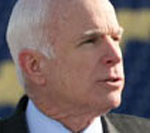 WASHINGTON, D.C.—Thank you all very much. I appreciate the kind introduction, and the invitation to address you. I see we have some students here, including a few from Arizona, and I welcome you to Washington. It's a pleasure, as always, to be in the company of the men and women of the American Israel Public Affairs Committee. And I know that all of us are proud to be in the company of the distinguished senator from the State of Connecticut, my friend Joe Lieberman. WASHINGTON, D.C.—Thank you all very much. I appreciate the kind introduction, and the invitation to address you. I see we have some students here, including a few from Arizona, and I welcome you to Washington. It's a pleasure, as always, to be in the company of the men and women of the American Israel Public Affairs Committee. And I know that all of us are proud to be in the company of the distinguished senator from the State of Connecticut, my friend Joe Lieberman.
All of you involved in the work of AIPAC have taken up a great and vital cause – and a cause set firmly in the American heart. When President Truman recognized the new State of Israel sixty years ago, he acted on the highest ideals and best instincts of our country. He was a man with courage and a sense of history, and he surely knew what great challenges the Jewish state would face in its early years. To his lasting credit, he resolved that the people of Israel would not face them alone, because they would always have a friend and ally in the United States of America.
The cause of Israel, and of our common security, has always depended on men and women of courage, and I've been lucky enough to know quite a few of them. I think often of one in particular, the late Senator Henry "Scoop" Jackson. I got to know Senator Jackson when I was the Navy liaison to the Senate. In 1979, I traveled with him to Israel, where I knew he was considered a hero. But I had no idea just how admired he was until we landed in Tel Aviv, to find a crowd of seven or eight hundred Israelis calling out his name, waving signs that read "God Bless you, Scoop" and "Senator Jackson, thank you." Scoop Jackson had the special respect of the Jewish people, the kind of respect accorded to brave and faithful friends. He was and remains the model of what an American statesman should be.
The people of Israel reserve a special respect for courage, because so much courage has been required of them. In the record of history, sheer survival in the face of Israel's many trials would have been impressive enough. But Israel has achieved much more than that these past sixty years. Israel has endured, and thrived, and her people have built a nation that is an inspiration to free nations everywhere.
Yet no matter how successful the nation of Israel, or how far removed from the Holocaust, there are experiences that will never pass from memory. Not long ago I was in Jerusalem with Senator Lieberman and our colleague Lindsey Graham, and we went to the Holocaust memorial, Yad Vashem. And for all the boundless examples of cruelty and inhumanity to be found there, for all the pain and grief remembered there, somehow I was especially moved by the story of the camp survivors who died from the very nourishment given to them by their liberators. They had starved and suffered so much that their bodies were too weak even for food. They endured it all, only to die at the moment of their deliverance.
These are the kind of experiences that the Jewish people carry in memory – and they are far from the worst experiences of the Holocaust. These are the kind of griefs and afflictions from which the State of Israel offered escape. And today, when we join in saying "never again," that is not a wish, a request, or a plea to the enemies of Israel. It is a promise that the United States and Israel will honor, against any enemy who cares to test us.
The threats to Israel's security are large and growing, and America's commitment must grow as well. I strongly support the increase in military aid to Israel, scheduled to begin in October. I am committed to making certain Israel maintains its qualitative military edge. Israel's enemies are too numerous, its margin of error too small, and our shared interests and values too great for us to follow any other policy.
Foremost in all our minds is the threat posed by the regime in Tehran. The Iranian president has called for Israel to be "wiped off the map" and suggested that Israel's Jewish population should return to Europe. He calls Israel a "stinking corpse" that is "on its way to annihilation." But the Iranian leadership does far more than issue vile insults. It acts in ways directly detrimental to the security of Israel and the United States.
A sponsor of both Hamas and Hezbollah, the leadership of Iran has repeatedly used violence to undermine Israel and the Middle East peace process. It has trained, financed, and equipped extremists in Iraq who have killed American soldiers fighting to bring freedom to that country. It remains the world's chief sponsor of terrorism and threatens to destabilize the entire Middle East, from Basra to Beirut.
Tehran's continued pursuit of nuclear weapons poses an unacceptable risk, a danger we cannot allow. Emboldened by nuclear weapons, Iran would feel free to sponsor terrorist attacks against any perceived enemy. Its flouting of the Nuclear Nonproliferation Treaty would render that agreement obsolete and could induce Turkey, Egypt, Saudi Arabia and others to join a nuclear arms race. The world would have to live, indefinitely, with the possibility that Tehran might pass nuclear materials or weapons to one of its allied terrorist networks. Armed as well with its ballistic missile arsenal, an Iranian nuclear bomb would pose an existential threat to the people of Israel.
European negotiators have proposed a peaceful endgame for Tehran, should it abandon its nuclear ambitions and comply with UN Security Council resolutions. The plan offers far-reaching economic incentives, external support for a civilian nuclear energy program, and integration into the international community. But Tehran has said no.
The Iranians have spent years working toward a nuclear program. And the idea that they now seek nuclear weapons because we refuse to engage in presidential-level talks is a serious misreading of history. In reality, a series of administrations have tried to talk to Iran, and none tried harder than the Clinton administration. In 1998, the secretary of state made a public overture to the Iranians, laid out a roadmap to normal relations, and for two years tried to engage. The Clinton administration even lifted some sanctions, and Secretary Albright apologized for American actions going back to the 1950s. But even under President Khatami – a man by all accounts less radical than the current president – Iran rejected these overtures.
Even so, we hear talk of a meeting with the Iranian leadership offered up as if it were some sudden inspiration, a bold new idea that somehow nobody has ever thought of before. Yet it's hard to see what such a summit with President Ahmadinejad would actually gain, except an earful of anti-Semitic rants, and a worldwide audience for a man who denies one Holocaust and talks before frenzied crowds about starting another. Such a spectacle would harm Iranian moderates and dissidents, as the radicals and hardliners strengthen their position and suddenly acquire the appearance of respectability.
Rather than sitting down unconditionally with the Iranian president or supreme leader in the hope that we can talk sense into them, we must create the real-world pressures that will peacefully but decisively change the path they are on. Essential to this strategy is the UN Security Council, which should impose progressively tougher political and economic sanctions. Should the Security Council continue to delay in this responsibility, the United States must lead like-minded countries in imposing multilateral sanctions outside the UN framework. I am proud to have been a leader on these issues for years, having coauthored the 1992 Iran-Iraq Arms Non-Proliferation Act. Over a year ago I proposed applying sanctions to restrict Iran's ability to import refined petroleum products, on which it is highly dependent, and the time has come for an international campaign to do just that. A severe limit on Iranian imports of gasoline would create immediate pressure on Khamenei and Ahmadinejad to change course, and to cease in the pursuit of nuclear weapons.
At the same time, we need the support of those in the region who are most concerned about Iran, and of our European partners as well. They can help by imposing targeted sanctions that will impose a heavy cost on the regime's leaders, including the denial of visas and freezing of assets.
As a further measure to contain and deter Iran, the United States should impose financial sanctions on the Central Bank of Iran, which aids in Iran's terrorism and weapons proliferation. We must apply the full force of law to prevent business dealings with Iran's Revolutionary Guard Corps. I was pleased to join Senators Lieberman and Kyl in backing an amendment calling for the designation of the Revolutionary Guard as a terrorist organization responsible for killing American troops in Iraq. Over three quarters of the Senate supported this obvious step, but not Senator Obama. He opposed this resolution because its support for countering Iranian influence in Iraq was, he said, a "wrong message not only to the world, but also to the region." But here, too, he is mistaken. Holding Iran's influence in check, and holding a terrorist organization accountable, sends exactly the right message – to Iran, to the region and to the world.
We should privatize the sanctions against Iran by launching a worldwide divestment campaign. As more people, businesses, pension funds, and financial institutions across the world divest from companies doing business with Iran, the radical elite who run that country will become even more unpopular than they are already. Years ago, the moral clarity and conviction of civilized nations came together in a divestment campaign against South Africa, helping to rid that nation of the evil of apartheid. In our day, we must use that same power and moral conviction against the regime in Iran, and help to safeguard the people of Israel and the peace of the world.
In all of this, we will not only be defending our own safety and welfare, but also the democratic aspirations of the Iranian people. They are a great and civilized people, with little sympathy for the terrorists their leaders finance, and no wish to threaten other nations with nuclear weapons. Iran's rulers would be very different if the people themselves had a choice in the matter, and American policy should always reflect their hopes for a freer and more just society. The same holds true for the Palestinian people, most of whom ask only for a better life in a less violent world.
They are badly served by the terrorist-led group in charge of Gaza. This is a group that still refuses to recognize Israel's right to exist, refuses to denounce violence, and refuses to acknowledge prior peace commitments. They deliberately target Israeli civilians, in an attempt to terrorize the Jewish population. They spread violence and hatred, and with every new bombing they set back the cause of their own people.
During my last visit to Israel in March, I saw for myself the work of Hamas in the town of Sderot, just across the border from Gaza. I saw the houses that have been hit by Hamas rockets. In the face of injuries, death, and destruction thousands of Israelis have fled the town. Many others have stayed, to carry on as best they can. I visited the home of a man named Pinhas Amar, who lives with his disabled wife, Aliza, and their children. One day, last year, the sirens sounded again to alert the town to incoming rocket fire. The rest of the family found cover. Aliza, on the other side of the house, was knocked out of her wheelchair and struck by shrapnel.
This occurred on December 13. And from that day until the day of my visit just some three months later, more than a thousand rockets had struck Sderot. Today, siren warnings are commonplace, the elementary schools are surrounded by concrete shelters and children walking the streets in costume for Purim celebrations did so in fear. No nation in the world would allow its population to be attacked so incessantly, to be killed and intimidated so mercilessly, without responding. And the nation of Israel is no exception.
Prime Minister Olmert and Palestinian President Mahmoud Abbas are engaged in talks that all of us hope will yield progress toward peace. Yet while we encourage this process, we must also ensure that Israel's people can live in safety until there is a Palestinian leadership willing and able to deliver peace. A peace process that places faith in terrorists can never end in peace. And we do no favors to the Palestinian people by conferring approval upon the terrorist syndicate that has seized power in Gaza.
Likewise, Israel's chance for enduring peace with Lebanon depends on Lebanese government that has a monopoly on authority within its country's borders. That means no independent militias, no Hezbollah fighters, no weapons and equipment flowing to Hezbollah.
Hezbollah fighters recently took up arms against their fellow Lebanese, starting the worst internal fighting since the civil war ended in 1990. In the process, they extracted an agreement for a new political arrangement in which Hezbollah and its allies can veto any cabinet decision. As the leader of Hezbollah often reminds us, this group's mission is the defeat of Israel. The international community needs to more fully empower our allies in Lebanon – not only with military aid but also with the resources to undermine Hezbollah's appeal: better schools, hospitals, roads and power generation, and the like. We simply cannot afford to cede Lebanon's future to Syria and Iran.
And we have an additional task. In the summer of 2006, Hamas and Hezbollah kidnapped three young Israelis – Gilad Shalit, Eldad Regev, and Ehud Goldwasser – and have held them ever since. I met with the families of two of these men in December 2006, and heard firsthand about their ordeal. I committed then to bring attention to their situation, to insist that the Geneva Conventions are observed, and to call for the swift release of these men. These men are being unlawfully held, and they must be set free and returned home to Israel.
Another matter of great importance to the security of both America and Israel is Iraq. You would never know from listening to those who are still caught up in angry arguments over yesterday's options, but our troops in Iraq have made hard-won progress under General Petraeus' new strategy. And Iraqi political leaders have moved ahead – slowly and insufficiently, but forward nonetheless. Sectarian violence declined dramatically, Sunnis in Anbar province and throughout Iraq are cooperating in the fight against al Qaeda, and Shia extremist militias no longer control Basra – the Maliki government and its forces are in charge. Al Qaeda terrorists are on the run, and our troops are going to make sure they never come back.
It's worth recalling that America's progress in Iraq is the direct result of the new strategy that Senator Obama opposed. It was the strategy he predicted would fail, when he voted cut off funds for our forces in Iraq. He now says he intends to withdraw combat troops from Iraq – one to two brigades per month until they are all removed. He will do so regardless of the conditions in Iraq, regardless of the consequences for our national security, regardless of Israel's security, and in disregard of the best advice of our commanders on the ground.
This course would surely result in a catastrophe. If our troops are ordered to make a forced retreat, we risk all-out civil war, genocide, and a failed state in the heart of the Middle East. Al Qaeda terrorists would rejoice in the defeat of the United States. Allowing a potential terrorist sanctuary would profoundly affect the security of the United States, Israel, and our other friends, and would invite further intervention from Iraq's neighbors, including an emboldened Iran. We must not let this happen. We must not leave the region to suffer chaos, terrorist violence and a wider war.
My friends, as the people of Israel know better than most, the safety of free people can never be taken for granted. And in a world full of dangers, Israel and the United States must always stand together.
The State of Israel stands as a singular achievement in many ways, and not the least is its achievement as the great democracy of the Middle East. If there are ties between America and Israel that critics of our alliance have never understood, perhaps that is because they do not fully understand the love of liberty and the pursuit of justice. But they should know those ties cannot be broken. We were brought together by shared ideals and by shared adversity. We have been comrades in struggle, and trusted partners in the quest for peace. We are the most natural of allies. And, like Israel itself, that alliance is forever.
Editor's Note: A day after Senator Barack Obama clinched the Democratic presidential nomination, his chief rival, Sen. Hillary Clinton, addressed the American Israel Public Affairs Committee in Washington D.C. yesterday. Here is the text of her remarks
 WASHINGTON, D.C—Thank you all very, very much. Thank you. It is wonderful being here with all of you, among so many friends and I feel like this is a giant family reunion. The largest AIPAC gathering in history and I feel like I am among family and thank you for the warm welcome. I want to thank my friend, Lonny Kaplan, for his leadership and that introduction. I also want to thank Howard Friedman for his leadership as president and to congratulate David Victor on his election. I want to commend Howard Kohr, AIPAC's distinguished board of directors, and all of the AIPAC staff who work so hard every day all year round. And I particularly want to acknowledge the many students in the audience from around the country, the future of AIPAC and the U.S.-Israel relationship. I want to pay tribute to one member of the AIPAC family and my very good friend who is not with us this year, Congressman Tom Lantos. Tom bore witness to the worst of human cruelty and devoted his life to stopping it. He taught us to stand up for what's right, even when it ‘s hard, especially when it’s hard. And we will always cherish his memory and his wonderful family will always be in our hearts. And finally, I want to thank all of you for coming to Washington, D.C., once again to stand strong with Israel and to strengthen that special bond between our countries. Being here today, I am reminded of a passage in Isaiah: "Upon your walls, O Jerusalem, I have posted sentinels; all day and all night, they shall never be silent." Just like the sentinels of old, you are never silent, you never grow weary and you never stop standing up for and fighting for Israel. WASHINGTON, D.C—Thank you all very, very much. Thank you. It is wonderful being here with all of you, among so many friends and I feel like this is a giant family reunion. The largest AIPAC gathering in history and I feel like I am among family and thank you for the warm welcome. I want to thank my friend, Lonny Kaplan, for his leadership and that introduction. I also want to thank Howard Friedman for his leadership as president and to congratulate David Victor on his election. I want to commend Howard Kohr, AIPAC's distinguished board of directors, and all of the AIPAC staff who work so hard every day all year round. And I particularly want to acknowledge the many students in the audience from around the country, the future of AIPAC and the U.S.-Israel relationship. I want to pay tribute to one member of the AIPAC family and my very good friend who is not with us this year, Congressman Tom Lantos. Tom bore witness to the worst of human cruelty and devoted his life to stopping it. He taught us to stand up for what's right, even when it ‘s hard, especially when it’s hard. And we will always cherish his memory and his wonderful family will always be in our hearts. And finally, I want to thank all of you for coming to Washington, D.C., once again to stand strong with Israel and to strengthen that special bond between our countries. Being here today, I am reminded of a passage in Isaiah: "Upon your walls, O Jerusalem, I have posted sentinels; all day and all night, they shall never be silent." Just like the sentinels of old, you are never silent, you never grow weary and you never stop standing up for and fighting for Israel.
Now, I know that there are some who say you shouldn't be here, who say speaking up for a strong, American-Israeli relationship is somehow at odds with America’s interests. Well, I believe that speaking up for a strong American-Israeli relationship is essential to our interests. And I reject that our common commitment to Israel’s survival and well-being is not in the best interests of the United States of America. I think you not only have a right to stand up for what you believe in, you have a responsibility as Americans to do so. You are acting in the highest American tradition, exercising a right enshrined in our constitution - the right to petition your government. And I applaud you for it.
Of course, I am privileged to represent one of the largest Jewish constituencies in the world. Is there anyone from New York even here in this audience today? I know you will be talking to your Members of Congress this week, but you won't need to ask me where I stand, because you already know the answer. I stand with you and for you.
The United States and Israel have an incredible bond, as allies, friends, as partners. We have shared interests. We have shared ideals. These are not just common values. They are our core values: freedom, democracy, and human rights, women's rights, a robust civil society. And we stand with Israel, because Israel demonstrates that democracy can flourish in the most difficult conditions, because its very existence is a stinging rebuke to hatred and the holocaust, because in defeating terror Israel’s cause is our cause, and because Israel’s struggle is a struggle not just for the Jewish people but for all people who want to live in peace and security under a democratically elected government.
President Harry Truman certainly understood the importance of Israel. He recognized the new nation just 11 minutes after David Ben-Gurion read the proclamation of independence. So it is with joy and some sense of relief that we celebrate the 60th anniversary of that day. And for all of the trials and tears, what a remarkable 60 years it has been. From my first trip to Israel in 1982 to my most recent, I have seen firsthand what Israel has achieved - the desert is blooming again. And we can be so proud of the role that America has played in this success. Every American president since Truman recognized the special relationship and has made it stronger. Israel is stronger because of us and because of you.
But even as we celebrate these achievements, we know the work is far from over. Israel is not yet safe. The values that Israel represents are not yet secure. Our hearts go out in particular to the courageous citizens of cities like Sderot and Ashkelon who live in fear that a rocket will fall on their homes or their children's schools at any moment. I have seen these security challenges firsthand. In 2002, I went to the Sbarro Pizzeria with then President Olmert just a few weeks after that tragic suicide bombing there. I visited with victims of terrorism in the Hadassah Hospital. I have been to Gilo and seen the security fence protecting Israeli families from attacks in their own homes. I have stood up and have spoken out for their right to have that protective fence.
As a senator from New York, who has talked way too much, I have seen the tragic toll of terrorism on 9/11 here at home as well. My support for Israel does not come recently or lightly. I know it is right in my head, in my heart and in my gut. And that is exactly the commitment we need in our next president - a Democratic president, because the Democratic Party’s strong commitment to the state of Israel since the days of Harry Truman endures today. It is one of our party's most cherished values and it will continue under the next Democratic president.
I know Senator Obama understands what it is at stake here. It has been an honor to contest these primaries with him. It is an honor to call him my friend. And let me be very clear: I know that Senator Obama will be a good friend to Israel. I know that Senator Obama shares my view that the next president must be ready to say to the world: America’s position is unchanging, our resolve unyielding, our stance nonnegotiable. The United States stands with Israel, now and forever.
Let me underscore that I believe we need a Democrat in the White House next January because it is not just Israel that faces challenges in the 21st century, America does, too. The next president will inherit grave problems, difficult threats - a war in Afghanistan and a war in Iraq, America’s reputation at an all-time low, the continued threat of terrorism at home and abroad. President Bush has moved us in the wrong direction. For all the strong rhetoric you heard from Senator McCain on Monday, he will continue the same failed policies in Iraq and weaken our security, making the Middle East a more dangerous place. America needs a new beginning in our foreign policy to make our country stronger and, frankly, to make our position in the world more credible, to give us the strategic leverage back that we have lost over the last seven years. We cannot stand strongly with Israel if we are not strong at home and if we are not respected and considered strong and the leader of the world everywhere else.
We have a rare moment of opportunity to change America’s course and restore our standing in the world. We must seize this moment by leading our friends and allies in building the world we want rather than simply defending against a world we fear. We must build a world that will be safer, more prosperous, and more just. I believe security and opportunity go hand-in-hand. When children have hope, a real belief that there is opportunity ahead for them, we help to dry up the swamp of fear and pessimism that breeds terrorism. That means supporting education, not just for boys but for girls too. It also means that real economic opportunity can't grow where there is no security. And that opportunity alone is not enough to overcome extremism.
I have been very specific about how I would make this new foreign policy vision that I share, and I think many of you do as well, a reality. Today I want to lay out three principles that I hope will guide us in all that we do with Israel and why it is important to put that relationship into the broader context of what foreign policy is in the best interests of the United States.
First, I have a bedrock commitment to Israel’s security because Israel’s security is critical to our security. When Islamic extremists, including the leaders of nations, proclaim death to America, death to Israel, we understand that our two nations are fighting a shared threat. Those of us in this room know this bond is so much more personal than any security agreement or risk assessment. We know a shared threat can also mean shared sorrow. When eight young men were killed in a Jerusalem yeshiva in March including a 16-year-old American named Abraham David Moses, we reunited in our grief. So, I strongly support Israel’s right to self-defense. Israel has both the right and the obligation to defend its citizens and I believe America should aid in that defense.
I am proud to support the $2.5 billion in security assistance for Israel and the Foreign Aid Bill and I am committed in making sure that Israel maintains a military edge to meet increasing threats. Part of our commit Israel’s security is a commitment to the Israeli-Palestinian peace process. I am deeply moved by the legacies of so many leaders who have sacrificed so much in the quest for peace, like my friend Yitzhak Rabin, and the warrior, Ariel Sharon, who is in our thoughts and prayers.
We must support Israel and in making the tough choices for peace. I believe that U.S. diplomacy is critical to making progress and consistent U.S. involvement can lower the level of violence and restore our credibility in the region. We need to talk to all sides but all parties must know we will always stand with Israel in its struggle for peace and security. Israel should know that the United States will never pressure her to make unilateral concessions or to impose a made-in-America solution. Palestinians will need to do their part by renouncing violence and teaching their children the ways of peace and tolerance. We must show Palestinians and moderate Arabs that the path of reconciliation is better than the terrorist road to self-destruction.
I am deeply concerned about the growing threat in Gaza. Hamas has built a military force equipped with sophisticated weapons from Iran. Hamas' campaign of terror has claimed the lives of hundreds of innocent Israelis. Its charter calls for the destruction of Israel. It has shown no commitment to peace or to renouncing violence. So, we must be clear about how we feel about our next president negotiating directly with Hamas. Here is how I feel: until Hamas renouncing terrorism and recognizes Israel, negotiating with Hamas is unacceptable for the United States.
We must continue to demand a return of the Israeli soldiers captured by Hamas and by Hezbollah - Ehud Goldwasser, Eldad Regev, Gilad Shalit. I have been privileged to know Karnit Goldwasser, Ehud’s wife and I was proud to sponsor the resolution that passed the Senate calling for their immediate release. I will not stop fighting and pressing for these soldiers to come home until they finally are safely home with the families that are waiting for them.
The second principle is a simple one: no nuclear weapons for Iran. Iran is a country whose leaders, whose president denies the Holocaust. He defies the international community. His government trains, funds, and arms Hamas and Hezbollah terrorists in attacking Israeli civilians. He threatens to destroy Israel. Just this week, he said that Israel is about to die and will soon be erased. We can never let Iran obtain nuclear weapons. The next president will have to deal with the Iranian challenge from day one. This is not just in Israel’s interests. It is in America’s interests and the world's interests, and this is a threat that I take very seriously. I’m a co-sponsor the Iran Nonproliferation Act. I support calling the Iranian Revolutionary Guard what it is: a terrorist organization. I have also said that should Iran ever, ever contemplate using nuclear weapons against Israel, they must understand what the consequences will be to them. But we must do everything in our power to prevent such an unthinkable day from ever happening and the best way to do that is to stop Iran from getting nuclear weapons in the first place.
We should start by developing an international consensus against Iran’s nuclear program with a set of tougher sanctions if Iran continues to defy the international community. We should also work with Israel and moderate Arab neighbors to roll back Iran’s influence in that region. If the Iranian government wants to become a responsible member of the international community, we would wholeheartedly welcome that change but Iran simply cannot be allowed to continue its current behavior and I wish to underscore I believe that we are further behind in constraining Iran today because of the failed policies of President Bush than we would have been had we taken a much more aggressive engagement course earlier. That is why it is imperative that we get both tough and smart about dealing with Iran before it is too late.
Now my third principle is standing up against hatred and anti-Semitism wherever it is found and it is not only Israelis and Jews who need to be speaking out against anti-Semitism, it is every fair-thinking person who understands that it directly affects you as well.
I have spoken out for years against anti-Semitism in Palestinian schools. I am appalled, still today, the Palestinian textbooks reject Israel’s right to exist and describe Israel’s founding as a catastrophe that's unprecedented in history. That is not education, it is indoctrination. We also know that the Saudis have textbooks describing Jews as wicked and we were all revolted when Iran’s President held a conference to deny the holocaust, but our vigilance against anti-Semitism must go beyond the Middle East. It must receive no quarter anywhere in the world.
The next president will face a test of resolve on this issue, at the 2009 Durban Conference, also called the Durban II. I will never forget how the world's first conference against racism became a mockery of itself when it descended into anti-Semitism and hatred. The debacle at Durban must never be repeated. We should take very strong action to ensure anti-Semitism is kept off the agenda at Durban II and if those efforts fail, I believe that the United States should boycott that conference.
The challenge of fighting anti-Semitism is indeed great, but we know it is possible to change hearts and minds. We saw it recently when Magen David Adom was finally included in the international Red Cross after years of being singled out for being Israeli. On one of my trips to Israel, I met an MDA member named Natan, an Ethiopian Jew who had saved many innocent lives when he tackled a terrorist carrying explosives. It was a miracle that Natan had survived. His valor was extraordinary and it was just what you would expect from a member of the MDA. That’s why I was so proud to take up the MDA’s cause, sponsoring legislation and speaking out. And I was very pleased as all of us were when the International Red Cross righted this historic wrong. On a personal level, I was honored when Natan accepted my invitation to come to New York and walk with me in our Salute to Israel parade. In a way we are still walking together and the image of this very dignified Ethiopian Jew, now an Israeli, walking in that parade down Fifth Avenue, bearing the scars of his heroic rescue effort to prevent the terrorists from destroying more lives, was one I will carry with me my entire life because that was really Israel. It wasn’t just everyone on the sides of the streets waving. It was this proud young man who had kept Jewish traditions alive and as a long string of those for centuries who had done so and who had finally come home to Israel and had given so much to protect the country that had given him a new life.
So while it can be easy to be discouraged when we look at the challenges ahead, we can never lose our resolve and never give up hope. What gives me not just hope but the underlying reality that can be delivered by those who work together, is that the power of the values we share with Israel are such an unshakable and unbreakable bond, and the difference that America can make is so critical.
Let me leave you with just in glimpse of why America matters and why AIPAC matters. In her memoir, one of my personal heroines, Golda Meir, wrote about the wonderful moment, 60 years ago, when Israel joined the family of nations and America stood at her side. Here is what she wrote: "a few minutes after midnight, my phone rang. It had been ringing all evening and as I ran to answer it, I wondered what bad news I would hear now." Doesn’t that sound familiar? "But the voice at the other end of the phone sounded jubilant. ‘Golda, are you listening? Truman has recognized us.’ I can remember what I said or did but I remember how I felt. It was like a miracle and I was filled with joy and relief." That was the decision that one American president made, to be there for Israel at a time of need. That is the decision that the next president must be ready to make as well. To the members of AIPAC, just know your cause is just, your voice is strong. Washington and the world is listening. So go forth and speak up for what you know is right.
Thank you. God bless you. God bless Israel and God bless America. Thank you all very much.


THE VIEW FROM JINSA
Was that Condy Rice... or Sandy Berger?
By Shoshana Bryen
 WASHINGTON, D.C.—The waning months of the Bush Administration sound more and more like the waning months of the Clinton Administration. The minions believe they represent the right people at the right moment, this moment and no other moment, to "solve" the "Palestinian problem" and provide lasting "peace" for Israel. Baloney. But consider Secretary of State Condoleezza Rice's remarks at the AIPAC conference this week and Dennis Ross and Sandy Berger precisely eight years ago. Plus ça change... WASHINGTON, D.C.—The waning months of the Bush Administration sound more and more like the waning months of the Clinton Administration. The minions believe they represent the right people at the right moment, this moment and no other moment, to "solve" the "Palestinian problem" and provide lasting "peace" for Israel. Baloney. But consider Secretary of State Condoleezza Rice's remarks at the AIPAC conference this week and Dennis Ross and Sandy Berger precisely eight years ago. Plus ça change...
Secretary Rice:
The expansion of violent extremism in the Middle East makes the creation of a peaceful, effective Palestinian state more urgent, not less... The present opportunity is not perfect by any means, but it is better than any other in several years, and we need to seize it. We need to take this chance to advance the historic and long-held aspirations of Israelis and Palestinians. Israelis have waited too long for the security they desire and deserve. And Palestinians have waited too long, amid daily humiliations, for the dignity of an independent state."
JINSA Report #144 (20 May 2000):
"I believe there is not a single issue - not the most complex, not the most sensitive, that cannot be resolved. It can be done and it should be done, now define in words and deeds how the 100 year conflict will end, and it must happen soon." NSC Advisor Samuel Berger in Tel Aviv.
"[Successful negotiations take] both sides looking at the other as a serious partner having serious needs, taking each other seriously. It takes both sides understanding that no one gets 100 percent. What's needed now is earnestness and a profoundly serious approach because we have a hundred years of conflict to resolve and it's no easy matter· there is an historic moment now and to lose it will impose a very heavy responsibility on everybody. Now, we all have a heavy responsibility to try to seize this moment and ensure that in fact we do forge an agreement that ends the conflict, at least between Israelis and Palestinians. And that is possible." Amb. Dennis Ross at AIPAC.
We wrote in 2000: It is generally a good thing that people who are transparently American in attitude represent America in international negotiations. Mr. Berger and Ambassador Ross are the soul of "can do" American optimism with their belief that all conflicts yield to their idea of negotiated settlement based on compromise. All we have to do is be "earnest and profoundly serious" and decide that now is the moment. No doubt the two of them are profoundly earnest; they are also profoundly wrong.
We add in 2008: No doubt Dr. Rice is profoundly earnest; she is also profoundly wrong.
We wrote in 2000: The core of the conflict is Arab refusal to accept the legitimacy of Israel (recognizing the fact of Israel as a fait accompli is not enough). And the core of the Palestinian tragedy is the refusal of the Arabs in 1948 to establish the Arab Palestinian State that the UN Partition Plan envisioned alongside the Jewish Palestinian State that was declared as Israel.
We add in 2008: Well, nothing actually.


THE JEWISH CITIZEN
Guardians' golf and tennis tournament a fitting Seacrest fitness-center fundraiser
By Donald H. Harrison
 RANCHO SANTA FE, California—There is something fitting about people playing golf and tennis to raise money for a fitness center for senior citizens. RANCHO SANTA FE, California—There is something fitting about people playing golf and tennis to raise money for a fitness center for senior citizens.
That’s what happened on Tuesday, June 3, at the 17th annual golf and tennis tournament sponsored by the Guardians, the men’s auxiliary of Seacrest Village Retirement Communities.
Approximately 80 golfers started shotgun style and another 16 participants paired off to play doubles tennis with the two tournaments played simultaneously at the Crosby Golf Club, named for crooner Bing Crosby.
Pam Ferris, chief executive officer of Seacrest Village, joked as she drove in a golf cart from one event to another that she was excelling in another sport: hooky. “I don’t play either golf or tennis,” she said, “but I like to be out here and I like to thank our supporters and it is what makes the Home the special place that it is.”
Ferris said the Guardians had agreed to donate proceeds from the fundraising event towards “the future expansion of the Encinitas campus where we recently opened our Katzin Residence for dementia and Alzheimer residents, but where now we are planning to build a vitality center with a pool and a multipurpose synagogue, a fitness center and, at the Lee and Frank Goldberg Residence Court, about 26 more independent-living apartments with full kitchens, washers and dryers.” Seacrest Village, which is the upscale successor to the San Diego Hebrew Home for the Aged, also operates a smaller retirement facility in Poway.
There’s an $18 million price tag for the Encinitas campus expansion, which will require certain utilities to be relocated to allow the new Ottenstein Vitality Center to be constructed between the Independent Living and Assisted Living areas of the Encinitas campus.
“We are relocating utilities to make way for that,” Ferris said. “People wonder why we are going to that extent, but I’ve been in this business long enough to know that if you build a building and you don’t make it convenient for people, it won’t be utilized. “
Asked to preview what the Ottenstein Vitality Center will look like, Ferris said it would be a “10,000-square foot building with 5,000 feet on the first floor which would encompass the aquatic center and the fitness center.” The aquatic center probably will have both a therapy pool and a lap pool, she said. “We haven’t designed it quite yet, but we have ideas and have done some research.”
The current fitness center on the Encinitas campus “is very inadequate because it is so small, and so many residents are taking advantage of the program, we want to expand it.”
Many of the people who played in Tuesday’s tournament were suppliers who wanted to thank Seacrest Village for giving them their construction business, or their air conditioning contract, or the opportunity to handle the investments of Seacrest’s Foundation. Through sponsorships, donations, auction items and entry fees, the golf and tennis outing will contribute to the capital campaign along with such other annual fundraising events as a fashion show and a gala.
 Some of the players like Earl Altschuler and Shearn Platt were people whose own families have included residents of Seacrest Village over the years. Some of the players like Earl Altschuler and Shearn Platt were people whose own families have included residents of Seacrest Village over the years.
Altschuler, president of the Guardians, said that his great-grandfather had been a resident of the San Diego Hebrew Home for the Aged during the 1960s when it was located in San Diego on 54th Street on a hill behind the Jewish Community Center. Both properties were later replaced by facilities that were built farther to the north to keep up with the Jewish community’s demographic patterns.
“About 1960, I went to the home and played my accordion for the residents,” Altschuler remembered. “So I go way back. I had a number of relatives who had been at 54th Street as well as at Seacrest. My grandmother was one of the first residents at the new location in Encinitas.”
When he decided to become involved in Jewish community causes, the Guardians seemed a natural fit, Altschuler reflected. He had good memories of
his boyhood “going to the Jewish Community Center, andmy parents bringing me to the pool there, and then walking over to the home to see my great-grandfather.”
Platt also spoke of familial ties. “I’ve been involved for many years; the Hebrew home is a passion of mine,” he said. “My mother was a resident and she lived to be 101 years old, so they took very good care of her. My sister was there until just two months ago, so they have been wonderful.”
Coming off the tennis courts, Brad Blose, Seacrest’s financial vice president, said he has played in ten of the 17 annual golf and tennis tournaments, which he described as usually friendly affairs with great camaraderie.
“One tradition we have is the mixed doubles,” he said. “You don’t play with the same person every time. “You get matched up with someone who may be really good one round, and maybe really bad the next round.” Under such circumstances, he said, people don’t get overly competitive and it is a nice way for people to meet others.
Richard Gaines and Jeff Cohen won first-place team honors in tennis; Ann Kavy and Steven Kavy were runners-up. In golf, the men's first-place foursome consisted of Harry Proctor, Marc Channick, Jon Schimmer and Peter Epstine, while the women's first-place threesome included Nancie Vann, June Feldman, and Susan Kabakoff. Runners-up in both categories were the foursome of Gary Levine, Justin Levine, Dick Avakian and Ron Perlman and that of Sheri Hallis, Sandra Weinstein, Lynn Gordon, and Marilyn Goldstein.
Other men and women's golf competitions included "closest to the pin" which was won by Paul Stubbs and Nancie Vann, who on the 11th hole came respectively within 4.5 feet and 6.4 feet of the target. Additionally, there were men's and women's three-hole putting contests, won by Devin Chodorow, who needed only 5 putts and by June Feldman who needed just one putt more.
On the golf links, I learned that even as people were keeping fit to help raise funds for the fitness center, so too were they “praying” to help raise money for the new synagogue.
“Come on! Come on! Come on!” I heard one golfer all but beseeching God as a long putt inched toward the hole. “Please…!” he said, looking heavenward.
 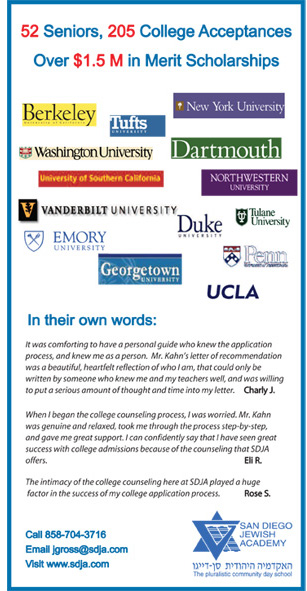

#49, Purely White
I always wear white wherever I go--
White that is pure as the fresh-fallen snow;
For white is the mark of my pureness of mind--
My pureness of body--as pure as you'll find.
I breathe only air that has blown from the sea.
I always use soap made from vitamin E.
I smoke no tobacco; I never taste wine;
And lips that touch nitrites will never touch mine.
I always wear white wherever I go--
White that is pure as the fresh-fallen snow;
For white is the mark of my pureness of mind--
My pureness of body--as pure as you'll find.
I rise with the roosters, retire with the hens.
I socialize daily by fasting with friends.
I smile at tormentors, let sleeping dogs lie.
I think only good thoughts: my dreams are all dry.
I always wear white wherever I go--
White that is pure as the fresh-fallen snow;
For white is the mark of my pureness of mind--
My pureness of body--as pure as you'll find.
I munch only peanuts; I never eat meat;
And sex is a no-no, because it's so sweet.
With all of this pureness there's this I'll admit:
It's honestly true that I lie quite a bit.
#297, Purely Black
I always wear black wherever I go--
Black that is blacker than coal on a crow,
For black is the color my love-making needs.
When I am in black, then loving proceeds
I love to make love in the darkness of night,
When sunlight is gone and it's long out of sight,
For loving in darkness I always feel free
To be the great lover that I'm known to be.
I always wear black wherever I go--
Black that is blacker than coal on a crow,
For black is the color my love-making needs.
When I am in black, then loving proceeds
To make up by day for the darkness I lack
I shun all bright colors; I wear only black.
I wear only black, which gives me a way
To make love at night and to make love by day
I always wear black wherever I go--
Black that is blacker than coal on a crow,
For black is the color my love-making needs.
When I am in black, then loving proceeds
.
#50, Together
You are black and I am white.
You are day and I am night:
Dusk to darkness, dawn to day,
Together sharing shades of grey.
You are woodwind; I am string,
Harmonizing songs we sing.
Together in a common beat
You and I make song complete.
You are laughter; I am smile.
You and I can both beguile.
You are sadness; I am tears.
Together we share same damn fears.
I am black and you are white.
Together we are day and night.
After day and night are done,
You and I are really one.
Together. . .together. . .
together. . .together.


 The The
Insiders
File
June 5, 2008
From time to time, we plan to use this space to update our readers on the comings and goings, achievements and tsuris of members of the San Diego Jewish World family, including its writers, photographers, editors and advertisers. It's our way to gratefully acknowledge and thank people whose contributions help assure that San Diego Jewish World reaches you day after day—Donald H. Harrison
 . .      
CORRESPONDENTS—Ulla Hadar, our correspondent in Sha'ar Hanegev, Israel, is taking a break from those cross-border rocket attacks from Gaza, visiting family in her native Denmark. ... Rabbi Dow Marmur, who writes "From the Sidelines" when he is in Jerusalem, is currently in Toronto, Canada, where he is rabbi emeritus of Holy Blossom Temple... Lloyd Levy, whom we like to call "Lloyd of London," has been sojourning in Eilat, Israel.
RECUPERATING—Gert Thaler, longtime columnist for San Diego Jewish Press-Heritage and San Diego Jewish Times, has been recuperating at Sharp Memorial Hospital from a mild stroke complicated by pneumonia. She suffered the stroke May 3 and, temporarily at least, she is unable to receive non-family visitors or phone calls. But she got word to us that she knows people have been leaving messages on her home phone and thanks them for their concern. Don't worry, she adds, it will take more than two little things like a stroke and pneumonia to knock her permanently out of commission. ... Peter Garas, our columnist in Canberra, Australia, has been sidelined by a battle with esophageal cancer. Gert and Peter, your colleagues as well as many readers all send their best wishes for a full and speedy recovery!
SIMCHAS—Norman Greene, former copublisher of the San Diego Jewish Press-Heritage, reports that his son Dan and new daughter-in-law, the former Samantha Mann of Los Angeles, are back from a honeymoon cruise that took in both Hawaii and Tahiti. En route, the couple won in a shipboard version of "The Newlywed Game." Meanwhile, Norman's wife, Roberta Greene, is preparing to retire after 37 years as a French teacher, her entire career spent at Montgomery High School in the Sweetwater School District.
UNVEILING—Gerry Greber, who writes for San Diego Jewish World, reports that he and his wife Marilyn will conduct an unveiling ceremony on Sunday, June 8, at El Camino Cemetery at the grave of their son, Steve, who died July 12, 2007 of illness in Poland, where he had established a chain of language schools.
AND FINALLY—Copublisher and resident travel agent Nancy Harrison, who celebrated her 60th birthday yesterday, said 2008 is a year for round-numbered occasions in her family. She and husband Don Harrison celebrated their 40th wedding anniversary in February, and they are looking forward to the 90th birthday of her father, Sam Zeiden, in October.


ADVENTURES IN SAN DIEGO JEWISH HISTORY
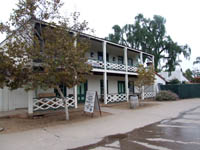
Robinson-Rose House
|
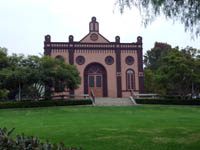
Old Temple Beth Israel |
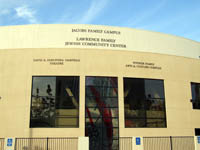
Lawrence Family JCC |
Editor's Note: We are reprinting news articles that appeared in back issues of various San Diego Jewish newspapers. You may access an index of the headlines of those articles by clicking here. You may also use the Google search program on our home page or on the headline index page to search for keywords or names.
Palestine Capable of Absorbing 1,100,000 Says Nathan
From Southwestern Jewish Press, January 16, 1947, page 1
Under the joint sposnorship of the United Jewish Appeal and the B'nai B'rith, Mr. Robert R. Nathan, noted economist, addressed a cpacity audience in the Temple Beth Israel last Monday night on the economic potential of Palestine. Featured with Mr. Nathan were Norbert Wollheim, vice chairman of the Central Jewish Committee in the British Zone in Germany and Samuel Shlomowitz, Chairman of the Central Jewish Committee in the American Zone in Germany.
Highlights of Mr. Nathan's speech are as follows:
1. Palestine can absorb from 600,000 to 1,000,000 Jewish immigrants within the next ten years without lowering the standard of living in the present Jewish population and allowing for an increase in the standard of living of the Arabs.
2. The greatest economic problem in Palestine today is the manpower shortage in industry, which can only be overcome by increased immigration.
3. The most important condition for the development of Palestine is the existence of a sympathetic government. Under the present archaic system, widespread economic development would be impossible.
4. A partititon plan providing the Jews with 30 to 35 percent of Palestine land and making arrangements for joint Jewish-Arab use of the water supply will allow for continued economic development and increased economic absorbtivity of the country.
Mr. Wollheim described the needs of the Jewish displaced persons and expressed their universal desire to migrate to Eretz Israel. Mr. Shomowitz echoed his words in Yiddish, "the language of the displaced persons."
"All of us are rootless," sai Mr. Wollheim. "All of us have lost everything in the world—family, wives, children, parents. We want to go to Palestine because we are wanted there. We, who have lost everything don't fear the risk of life. We go to Palestine because there is no other way."
Palestinian To Speak Here On Tuesday
From Southwestern Jewish Press, January 16, 1947, page 1
The Jewish Community of San Diego has a rare treat in store for it when Miss Rivka Yoffee, native-born Palestinian will speak Tuesday evening, January 21st at Temple Center, 3rd and Laurel Streets.
The little lady with a "Big Voice" is a delegate of the Moatzath Mapoaloth (Working Women's Council), the central driving body of the working women in Palestine. Her "big voice" speaks for thousands of women in Palestine and the magnificent role they are playing in the upbuilding of the Jewish Commonwealth.
The Palestine delegate was invited to the United States by the Pioneer Women's Organization, the local branch of which is sponsoring this meeting on January 21st, to stimulate a $650,000 campaign drive to help its sister organizationin Palestine expand its ever increasing refugee program as well as train and prepare women for ariculture and industry and educate the future Jewish leaders.
Mis Yoffee, who is a Palestinian of the fourth generation, is a teacher by profession. During the war she served with the PATS—similar to the American WAC—of the British Army, from which she was recently discharged. She describes Palestine as a young country with women who have a pioneering spirit which is vital to its growth. She added:
"There is little difference between the battle of Dunkirk and the battle for Palestine for us Jews. You don't hear the roaring of guns and bombers. Instead you hear the sounds of hammers and spades, of tractors and bulldozers. Men and women are working side by side in the formation of new enterprises, new settlements, sport centers, cultural centers and children's schools."
The Pioneer Women's Organization invited everyone to attend this meeting.
We Were There
From Southwestern Jewish Press, January 16, 1947, page 2
By Albert Hutler
Yesterday two men, Wollheim and Shlomowitz {see first story} rolled away a year from my life and took me back to Germany. They were representing the Displaced Persons in the American and British Zones of Germany at the United Palestine Appeal conference in Los Angeles. I was once again sitting in the dining hall of the Jewish Displaced Persons at Stuttgart and listening to them speaking in Yiddish and English. We knew their hopes for peace, for security and for liberation. Again I could hear Meyer Guttman, chairman of the Jews of Stuttgart, asking in the name of all of his Jews the right to live again in Palestine. There was little bitterness in his speech, but there was a great deal of faith.
And yesterday in Los Angeles there was little bitterness in the please mde by Wollheim and Shlomowitz. They only felt that we would forget them, and as Wollheim said: "The greatest tragedy is to be forgotten." They brought a message to American Jewry which we, who were there, know only too well. The Jewish Displaced Persons, 225,000 of them, have been saved but not liberated. They have suffered, but are not broken. "Not relief, in the form of charity, but in the form of resettlement and rebirth and a new life is what we need!"
With the ending of UNRRA, and the lack of intergovernmental assistance, the problem falls more heavily on the Jews of America. The thesis of the United Palestin Appeal conference in Los Angeles which was really a United Jewish Welfare Fund meeting, can well be accepted by every thinking community in America. That slogan should be taken to heart by those of us in San Diego. The chairman of the conference, Julius Fleigelman, beautifully expressed the thought of American Jews when he opened the conference with these words: "When the world cares less we must care more."
{Return to top}

Nancy Harrison
cruise & tour specialist
(619) 265-0808

SAN DIEGO JEWISH WORLD THE WEEK IN REVIEW
)
Middle East
Condoleezza Rice's stand over Gaza scholarships is counterproductive by Shoshana Bryen in Washington, D.C.
United States of America
Elections, conversions, award ceremonies: the shehecheyanu moments of springtime by Donald H. Harrison in San Diego
Lifestyles
Women are the subject of our local Jewish trivia quiz by Evelyn Kooperman
Adventures in San Diego Jewish History
—January 9, 1947: Kaufmans Feted On Departure
—January 9, 1947: Jewish Labor Committee by Ben Feinberg
—January 9, 1947: Pioneer Women's Organization
Middle East
Israel, at 60, has many kvelling points by Dorothea Shefer-Vanson in Mevasseret Zion, Israel
Syria's 10-meter problem at the Kinneret by J. Zel Lurie in Delray Beach, Florida
The Arts
Masterful retelling of Shoah in Vilna by Donald H. Harrison in San Diego
From Red Diaper Baby to Citizen Josh by Carol Davis in San Diego
Lifestyles
Are you lazy? You can put the blame on your genes—when you get around to it by Natasha Josefowitz in La Jolla
Adventures in San Diego Jewish History
—December 16, 1946: That's What I Think by Ray Solomon
—December 16, 1946: J.C.S.C. by Joe Wertheim
—January 9, 1947: Robt. R. Nathan-Wollheim To Speak Here Monday
Middle East
Ehud Olmert, does clock tick for thee? by Ira Sharkansky in Jerusalem
Jerusalem Day at Mercaz Harav Yeshiva by Judy Lash Balint in Jerusalem
Operation Homefront: Helping our American troops, no matter our politics by Rabbi Leonard Rosenthal in San Diego
The Arts
Zohan restyles Jewish comedy by Rabbi Simcha Weinstein in New York
A production you'll get a big bang out of by Carol Davis in Solana Beach, California
Lifestyles
Why the Bella Family Circle stopped its annual tradition of selling white elephants by Sheila Orysiek in San Diego
Adventures in San Diego Jewish History
—December 12, 1946: Bergen Belsen Director to Speak
—December 12, 1946: Black Book Now at Public Library
—December 12, 1946: Welcome Home...A Job Well Done
Middle East
Zbig's efforts to accommodate Iranian mullahs didn't work then; won't work now by Shoshana Bryen in Washington D.C.
Author asserts Palestinians' ancestors converted under pressure from Islam by Donald H. Harrison in San Diego
Judaism
The Sinai and the modesty commandment by Rabbi Leonard Rosenthal in San Diego
Yes, she was Jewish, but she had to ask her father what Yom Kippur was all about by Rabbi Baruch Lederman in San Diego
The Arts
'La Jolla North' at the Statford Festival with Des McAnuff; Shaw Festival also pleases by Carol Davis in Stratford, Ontario, Canada
Adventures in San Diego Jewish History
—November 7, 1946: Junior Charity League
—November 7, 1946: Relatives Sought
—December 12, 1946: Maxwell Kaufman To Be Honored At Dinner
Yael Bugin in Kibbutz Kfar Aza, Israel: Kfar Aza resident to Hamas: We are here!
Cynthia Citron in Los Angeles: Ford, Lebouef and Spielberg team up for another hilarious Indiana Jones adventure
Carol Davis in San Diego: Zeji Ozeri starts San Diego Jewish Art Festival off with a zesty Israel tribute
Ulla Hadar in Ibim, Israel: Students have village of own in Ibim
Donald H. Harrison in San Diego: WIZO dinner, JAFI director provide perspectives on North American Jewry
Sheila Orysiek in San Diego: Chapter Ten in the serialization of her novel, Reluctant Martyr
Ira Sharkansky in Jerusalem: Olmert probe may trigger government crisis
Adventures in San Diego Jewish History: What was the Jewish community news in 1946? Who were the newsmakers? Our archives answer these questions in daily installments
Link to previous editions
< BACK TO TOP
|
|
